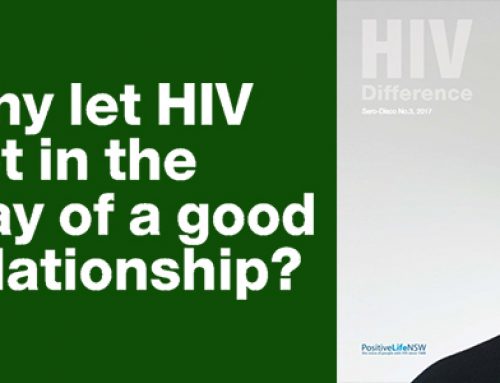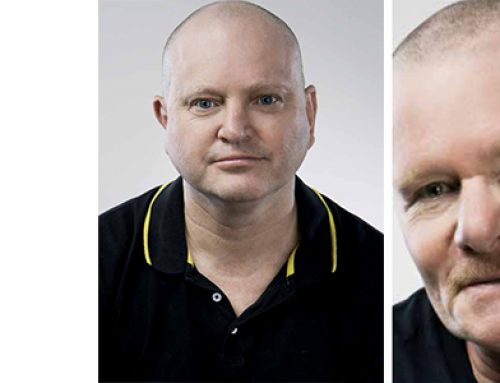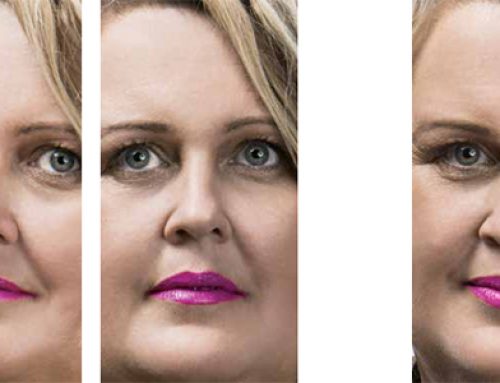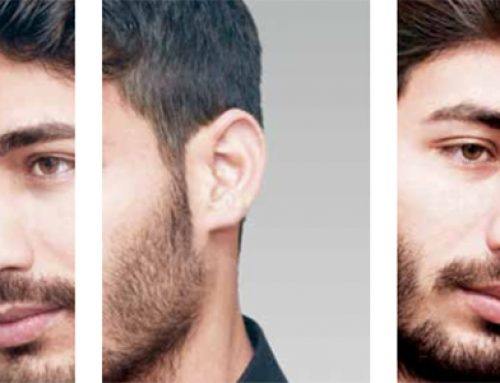His story is a journey of HIV difference; of changing times and rethinking beliefs. And how information and disclosure can overcome your fears and help you take control to have the kind of relationships you want to have.
Another time
Robert grew up in country New South Wales. He discovered he was gay at eighteen but didn’t come out until he moved to Sydney a year later. It was the late 1980s and he found himself in a city in the midst of an AIDS crisis.
“It was a pretty scary time for everyone,” he recalls.
“It seemed like every week, you’d open the paper and see the face of someone you knew who had passed away.
“I would probably have run a mile if someone with HIV had approached me for sex at the time,” he says.
Robert was diligent about adhering to safe sex and ensconced himself in a monogamous relationship. When that ended several years later, he found himself another. By the time that one ended, it was the late nineties. Robert was single and looking for love.
In 2003, he finally met the man of his dreams. They dated for a few months before Carl dropped the bombshell and told him he had HIV.
“I was terrified,” Robert recalls. “Suddenly, all the horrific memories came back … of the late eighties and early nineties … of friends passing away in awful circumstances.”
But he had fallen in love and despite being haunted by the ghosts of the past he couldn’t walk away.
It took him some time to come to terms with how he would cope being with someone who had HIV.
But as he began to re-educate himself, he discovered how much had changed.
“The drugs were much more effective. Life expectancy had increased. It was much more manageable,” he remembers.
Carl had only been diagnosed in the year prior to meeting Robert, so he too was on a sharp learning curve. Together they supported each other and adjusted to an HIV different relationship.
“We always practised safe sex,” says Robert, “from when we met all the way through to about 2005. By that stage we were both quite heavily into recreational drugs.”
Carl was having side effects from his meds at the time. They were making him depressed and he had taken a treatment break. Neither of them had any knowledge of the risks associated with a detectable viral load.
“And there was one night …” Robert continues “… the only time we had unprotected sex … and that one time was when it happened.”
Different status
Robert became quite ill. Subconsciously he knew something was wrong. But he avoided going for a test.
“I don’t quite know how I rationalised it,” he says. “But it wasn’t until a year later that I finally found out I had HIV.”
He now had to go through another readjustment. But this time it was not the fear and worry of his partner getting sick and dying. He had to come to terms with his own HIV infection as well as the reality of starting treatment for it.
Happily, Robert and Carl’s love for each other was strong enough to survive the transition. They had a commitment ceremony. “Which was a big to-do for us,” he says.
Robert disclosed to his mother about everything that had happened. He was surprised by how calm and reassuring she was. “Which was a great relief. And also a great support,” he says.
Things were good. They settled back into life together. They paid the bills and took the pills. Went to parties and saw their doctors.
“Then things started to go off the rails,” Robert recalls.
“Carl wasn’t working and the financial strain was getting to us. He was depressed and spent a lot of time at home. His drug use started escalating.
“By October 2010 things had got out of control and he … quite shocking actually … after a couple of years of trying to help him get back on track … he was the one who left.”
“It was pretty devastating,” says Robert. “Carl was the love of my life. We had been through a lot together. I couldn’t believe it was over.”
Changing attitude
Robert was now out on the dating scene again.
“I’ve never been into sex venues or casual hook-ups,” he says. “They make me nervous.”
He liked the intimacy and companionship you can get in a relationship. But at that stage in his life he was very wary of having one with anyone: positive or negative.
“I had a short relationship with an HIV negative guy,” he recalls. “Until he became quite pushy about having unprotected sex.”
It was 2011, and Robert didn’t know anything about the relative low risk he posed being on treatment with an undetectable viral load. So he ended the relationship and for a while avoided having sex with anyone unless they were also positive.
“I perceived the risk to be the same whether you are on the meds or not,” he says.
He then had a relationship with another HIV positive guy that lasted for eighteen months.
It was now 2013 and although he had been single before, things had moved significantly.
“So many guys who are negative want to have unprotected sex,” he says. “I needed to research the information on the risks involved.”
“That’s when I discovered the new facts about treatment and viral loads and PrEP. It forced me to rethink my beliefs about what is safe behaviour.
“I had always felt that because I was positive I was responsible. I was always trying to avoid the scenario where someone contracted the disease from me. And the fear and guilt that goes along with it. I’d seen what that had done to Carl. He used to bring it up constantly. About how guilty he felt.
That it was he fault. I never thought it was. I always held myself accountable. “But I was forced to re-evaluate things. Sex without condoms is so commonplace now. It’s what negative guys are asking for.
“Some of them are very well informed. They know the risks. They may even be on PrEP. Others don’t care and are willing to do whatever. Then there’s a third group who are uneducated and won’t entertain the idea of being with a positive guy.
Fortunately, they are very much the minority.
“To me, status isn’t important. If I’m screening, I’m screening for how informed they are about the current research.
“Attitudes to STIs have also changed. They’re not seen as such a big deal. People are now more likely to tell you they have one.
“I’ve certainly had the experience where someone has told me they’d tested positive for something and they don’t know whether they’d passed it on to me or got it from me. And then I’ve tested and been fine.
“I think that’s all about being respectful of your sexual partner’s health.
“I have a policy of disclosing before any sexual activity happens. If they are negative I’ll generally ask them questions about their preferences, their knowledge of risk and whether they’re on PrEP or not.
“One guy I am seeing casually is very open about being on PrEP. He says it isn’t just so he can have unprotected sex … He sees it as a safety net that makes him feel comfortable enough to have any sex at all.
“These days I’m much less fixed in my beliefs. And I think others are, too.”






